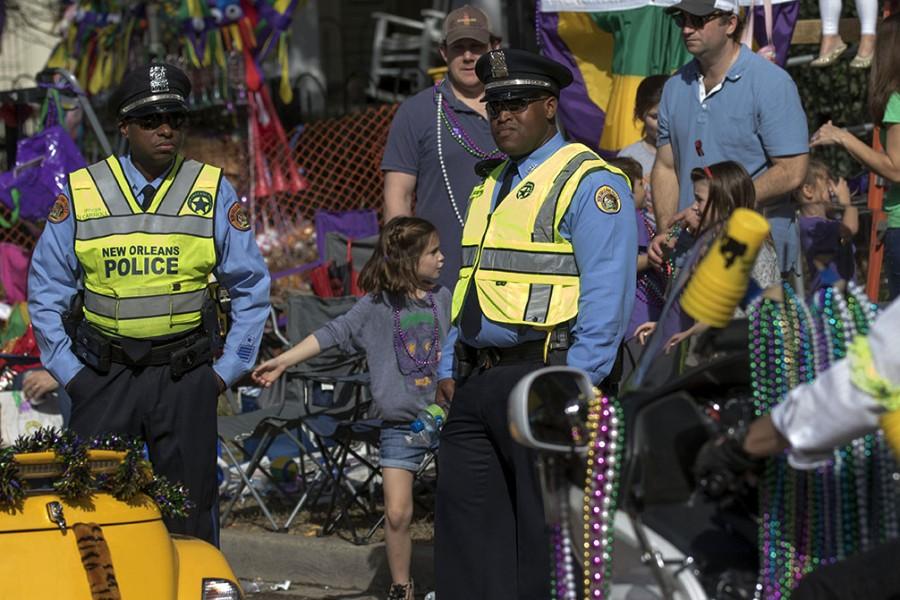Mardi Gras: lawfully
In charge of controlling the chaos, Carnival is a busy time for the New Orleans Police Department
Officers Carroll, left, and Moore-Hazelett, right, stand on duty during the Krewe of Carrollton.
February 4, 2016
With the mayhem of Carnival season descending upon New Orleans, there is one group of people who don’t have the luxury of forgetting their worries: the police.
In charge of controlling the chaos, Carnival is a busy time for the New Orleans Police Department.
The NOPD takes on many different roles during the festivities. From leading parades to ceremonially clearing out Bourbon Street as Mardi Gras ends, police culture and Carnival are entwined together.
However, the most important job for officers is making sure that people can enjoy Carnival without having to fear for their safety.
George Capowich, Loyola sociology professor, said he feels that the primary purpose of the NOPD during Mardi Gras is clear: crowd control.
“Police are primarily focused on making sure that Mardi Gras comes off as orderly as possible,” Capowich said. “Their main attention is on traffic control, crowd control, maintaining order on the parade routes, that sort of thing.”
Ronal Serpas, former New Orleans Police Chief and current Loyola criminology professor, echoes those sentiments and said that police officers usually only get involved if someone is likely to be injured.
“Sometimes people enjoy Mardi Gras maybe more than they can tolerate,” Serpas said. “An example is sometimes people just drink so much or too much for what they’re accustomed to that they find themselves walking up next to floats, grabbing for throws on floats, and there have been unfortunate examples in the history of Mardi Gras that this could result in them being injured, or worse, killed.”
But despite assertions such as these, there remains a fear among many that they themselves may end up getting arrested during the festivities, an idea further driven by the notion that it is widely believed that if you are arrested during Mardi Gras, you remain in lockup until Ash Wednesday. And while this may seem to be a reasonable concern, it’s not true.
“That’s probably an old wives’ tale,” Serpas said. “The booking process takes time, and if there are more people being booked than normal, then it might take longer, but those issues the sheriff’s office maintain and control, so the police have very little to do with that.”
R. Judson Mitchell, Loyola law professor, confirmed that there is no legal backing behind the idea of being locked up for all of Mardi Gras.
“Clearly, that’s not true,” Mitchell said when asked about the rumored policy. “If the police arrest you, they have a mobile booking facility, so even if they do arrest you, you can be booked away from central lockup.”
Mitchell also debunked the rumor that public urination could land you being registered as a sex offender.
“I’ve never seen that happen,” Mitchell said. “Public urination is not one of the offenses listed as a sex offence in Louisiana.”
However, according to Capowich, there are some laws, specifically concerning parking and interaction with floats, that police enforce more strictly during Mardi Gras. And there are also some laws that people just don’t normally think about.
“There are a number of things, you know, interfering with the parades even in exuberance or being drunk, you know, you’ve got to stay away from that,” Capowich said. “Don’t overreact. There are things that happen on the street, you know, you get run into, you don’t want to take it personally.”
Serpas said there are certain things that college students in particular can do that may end up getting them in trouble.
“Don’t do anything that you know is wrong,” Serpas said. “Obviously, you’re going to have a drink, that’s not the issue. Where people get themselves in trouble, particularly college-aged students, is that they don’t normally drink a lot during the week, and then they get into this Mardi Gras environment, and sometimes they just drink more than they’re used to, and it’s not uncommon to see a lot of young people literally passed out.”
Drew Brekus, Loyola economics sophomore, said he feels that Mardi Gras is an overall safe event, from his experience.
“I do feel safe during Mardi Gras,” Brekus said. “I don’t feel like the crowd’s going to attack me at any time, and, regardless of whether the police come into that feeling of safety, I do feel relatively safe during Mardi Gras.”
Capowich left a bit of advice for people looking to enjoy Mardi Gras.
“If you don’t like crowds, then don’t go,” Capowich said. “Or go somewhere where it’s not quite as hectic. But all things being equal, the more people you’re around, the safer you are.”








